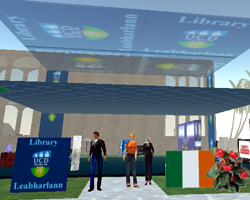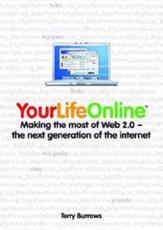A colleague said that now they have finished the Learning 2.0 program, they are going back to check they completed all the required tasks to ensure their eligibility for the certificate. I definitely did lots of Discovering, Exploring and Adventuring but I thought I had better revisit the program outline to make sure I had made some relevant comments on my blog. So here goes!
Week 1: Let's Get Started. Watch the Stephen Fry video. Done! I watched this at home, due to problems accessing it at work and made some comments about it on the main forum, such as:
"I'm with Lesley on that first video. Even though I consider myself as not exactly a technological philistine, I also had to watch that one a couple of times. I suppose it summarised so much development in such a short space of time, so whilst the content was familiar the speed was a bit intense. I was wondering how someone who perhaps was unaware of much of the new technology would fare with that one.I found the fact that the term 'news' seems quite rubbery and uncertain now. I liked the fact that these new tools are not as important as what we use them for but I question how much value is being added in a vast proportion of the blogs, etc, in existence today (from a large scale perspective). I did enjoy Mr Fry's comments - such a wonderful individual with so much to offer. I too, have rediscovered lost moments through the 'miracle' of the internet and the new technologies, such as a song I downloaded (legally) this morning that I had not heard since 1979 as a child. There seems ample opportunity for self indulgence using these tools, but I am interested in the greater value to the world (and not just the humans in it either)."Week 2: Intro to Blogs. Set up a Gmail account and then a blog through Blogger.com. Make some first postings reflecting on the program and what you have learned so far. Done! Interestingly, I don't seem to have received any emails at my Gmail account since mid-April, so not sure if there is a problem there. I haven't posted much to my blog since I completed the program, but I think I will still use it in the near future, until such time as I start a different blog. My Uni semester is 'hotting up' so I can't spend as much time on my blog or discovering new Web 2.0 things at this moment.
Week 3: Sharing Images. Explore Flickr and discover an interesting image to write about on your blog. Provide a link to the image or post it on your blog. Done! I chose not to open a Flickr account but I provided both a link to an image and uploaded an image through the Blogger upload tool. I also helped several people at my work to successfully upload images to their blogs, after they experienced many problems doing so. On the main forum, I posted:
"Well, I found uploading and linking photos to my blog a little tricky but finally ironed out a few minor problems and it worked at last! I found searching the images on Flickr.com and other sites (eg the Library of Congress) fascinating but I do have reservations about uploading personal photos myself. I can definitely see the benefits for an organisation, such as a library, though."Week 4: RSS. Create a Bloglines account and connect at least 5 RSS Feeds to your account. Comment on how you find RSS. Done! I subscribed to several including the British Library and the Powerhouse Museum's Picture Of The Day. Since then I have added a few more, such as the Animals Asia RSS feed from their new website, but refer to my previous blog postings (eg 3 March). I also posted the following on the main forum (which I think is similar to what's on my blog):
"I am still undecided about RSS. It was quite fun setting up the reader and subscribing to feeds (although it varied considerably from one website to another in how easy this was to achieve!). Like Jenny commented, at the moment I can't really see much benefit to me personally over the daily emails I already receive from the various websites of interest to me. I can see that the reader would be useful if you subscribed to a great many feeds and needed to manage them.For a library though, I can see RSS would be really beneficial. The library would have a great online method of promoting library events, services, new collections, and so on, to members and customers. This is especially great for the customers who don't visit the library often in person. I think libraries really have to got to not only 'keep up' (especially with the younger library users) but really be at the forefront of technology and RSS seems one good way of achieving that."Week 5: Wikis. After learning about wikis, obtain the invite key to the NSW Learning 2.0 wiki and edit it. Done! Refer to my postings 8-11 March. I also posted the following to the main forum:
"Wow! I have learned so much more about Wikis than I knew before. I have used Wikipedia of course and I had thought about version control, and people adding bogus information, but didn't realise spam was such a problem. I had no idea about how one would go about setting one up. I always liked the idea of using Intranets and chat in a business setting but I found Intranets often disappointing. Often the info was way out-of-date and it seemed like no one took the time to 'tend the garden' regularly (to borrow the spade idea from Intellipedia). Chat was good but not so good for collaboration and it seemed to me that no-one ever used the expanded benefits of software like Lotus Notes. I can really see that wikis would work well, and I anticipate our library will jump on board very soon! I love the ability for everyone in the library to contribute easily, even those who aren't so hot with computers. I can see how the wiki could be the 'hub' for the library online with resources linking off from it. It is all VERY interesting to me!BTW, I really enjoyed the Information Today article - academia has some fabulous opportunities if it would only grab them. Just a question: why is pbwiki's logo a sandwich???"Week 6: Videos Online. Blog about your discoveries in both YouTube and Google Video. Done! See my March postings. I also posted to the main forum:
"I must admit I hadn't used Google video before. I have noticed on YouTube.com you often find a video (such as a comedy routine or program) broken down into parts because of the capped time, but I hadn't really thought about it much. Author talks are certainly better being viewed in one go without all the interruptions!""In response to wscaster's problem embedding a Google video, I just tried the following and it worked:On the right hand side of the video, there is a blue button stating "Email - Embed HTML". If you click on that, it then says Send Link - Embed HTML. Click on the Embed HTML link and you will see the code. Copy and paste the code into your new blog post window (you can use the Compose view, don't have to use the HTML view). Anyhow, give it a try!"I must say that, since I use YouTube on almost a daily basis, I can really see how annoying it is to have relatively small time-limit on videos for some things. On the other hand, some of these videos are probably not even supposed to be on YouTube at all (ie, whoever has posted them is breaching copyright). I notice some videos keep getting removed but as fast as they do that, someone (or maybe the same person) will re-post it. There are so many videos now, it is possible to watch something as old as a clip from a George Formby movie, or the latest TV commercial! Videos are now being rated, eg 'good audio' to assist people in selecting one of several versions available.
Week 7: Tagging, Folksonomies, del.icio.us and Library Thing. Post about the usefulness of social bookmarking for libraries. Done! (see previous postings). Set up your own del.icio-us account. I had already done this, not long before I heard about the Learning 2.0 program. I love the tag cloud and think it would be wonderful to have this for our library. Register your blog with Technorati. I did this and got confirmation that it was done, but to date I have failed to locate my blog on Technorati. I read the help pages and forums and it does seem there are glitches as well as many many people waiting to get the blogs registered. LibraryThing was my favourite thing from this week. Set up my library and got it to feed to my blog. I was so excited about LibraryThing I couldn't help blabbing about it to work colleagues. It gave some of them something to aim for when they were stuck in Weeks 2 or 3. I also posted the following to the main forum:
"I got the same number of hits for the standard search in Technorati as for their advanced search, using the search terms suggested. What am I missing here?!?" (re the Technorati exercise).
"Thanks Jalen! I did try the tag search for the term 'bookmobile' and got considerably fewer matches. However then I tried another term and got the same results for either keyword or tag. I guess it depends on how the articles have been tagged!""I have been trying out the Kingston Public Library (VIC) catalogue as they have built LibraryThing into it (try this link). It's great fun and seems to work very well. You can search on an author, pick a title, then view the tags, click on tags to bring up new items, then click on those and view the status in the catalogue (ie, available to borrow or not, etc). Wish we had this at my library!"Week 8: Answer Boards and Social Searching. Done! See my March postings. I don't know if we have the staff resources at the moment to run this type of thing at my library but we must go in this direction if that is what our customers want and what they expect. We have some experienced reference librarians and staff who don't seem to be getting the reference questions they deserve! Perhaps, if reference could be moved to this online setting, staff would be able to help customers and have better job satisfaction as a result. I think many of our customers hold the reference staff in high regard (unfortunately to the point where they are sometimes reluctant to approach the reference desks!) and they would be more than happy to rate both our services and our collection. We receive verbal comments quite often and so I am sure online responses would not be far off. I posted the following to the main forum:
"Yes, the online brains trust! Let's get users to trust our brains! I think promoting library services through AnswerBoards is a great idea and keeps us in the public eye." because I really think librarian and library staff need to keep reminding people about the quality services we provide and we must go to the customers, not expect them to come to us!
Week 9: Podcasts and Audio. Listen to some podcasts and blog about how the library could use them. Done! Refer to my posting of 23 March. I also posted the main forum:
"Still getting to grips with the usefulness of podcasts and vodcasts but I am getting the hang of subscribing now, whereas previously I don't think I really knew what I was doing. Of course, that's because I am not a teenager!"I can see that many of our customers would enjoy podcasts and many have MP3 players, but I think much depends on the quality of the podcast as to how popular they would be.
Week 10: Mashups. Explore Keir Clarke's Star Viewer. Done! This week was also heaps of fun and I enjoyed learning about the way you can use different technologies together to create something new or even unique! Refer to my postings of late March. These are definitely something libraries can use by drawing together different content to suit a particular client group at a particular moment in time. I posted to the main forum:
"Hi net_goody! The Keir Clarke link goes to his blogspot and there is a link at the bottom of his page to the Star Viewer under the heading " Google Sky vs Star Viewer"." as another Learner seemed to have a problem with a link.
Week 11: Online Applications and Tools. Watch the Slideshare slide show. Create a document in Google Docs and share it with nswpln. Done! Also set up a Zoho account for comparison - refer to my blog postings for comments. I found this week very interesting, although the online docs, etc, I thought would be more useful for me at work, more than for the library customers. The slideshow, however would be a great method for presenting info to customers. I also posted the following to the main forum:
"Like Superchicken, I find the sheer number of FREE online applications staggering. Sharing has never been so easy (or accessing your own docs to update them wherever you are). I was going to try converting a file using Zamzar, like Jenny, but then realised the file I had chosen was probably copyrighted so backed out! I will try it again soon with something of my own. It's all just mind-boggling and the simplicity factor is just so right! 'They' (the developers) seem to have thought of everything."Week 12: Wrap up; social networks and catch up. Reflect on how libraries can use social networking, and libraries in Second Life. Done! Comments are on my blog (see April postings). I posted the following on 9 April 2008:
"Well, I finished up the program this evening and, like Jalen, I feel it's been a wonderful journey. There were a few tools I had been meaning to look into but kept putting it off but this program has made me learn about them and so many more I had not even heard of! It has been heaps of fun and so very interesting. I really hope I get to use some of it at my workplace soon. Thanks to all the SL (that's State Library NOT Second Life) team for the program and for the comments. It's been fantastic!"WOW! I really hope I have covered everything! What's important to me, though, is how much I have learned over a relatively short time. I no longer feel like I am totally in the dark about these applications and tools and I also feel a little more 'on par' with the younger generation of customers who use our library.
Upon ReflectionAlthough it is all very new, and virtual 'life' seems very strange, there is no doubt that this is the way things are headed whether we like it or not. I love reality but I also love online stuff and this is the next step. I am too old to really feel as comfortable as many young people do about sharing their lives so freely online, but I welcome developments such as Virtual Reference. Second Life is creepy to me, but it probably will not always remain so. I think it is partly because I connect SL with the seedier side of online life. I started using the internet back in 1995 before the GUI (graphical user interface) and have seen some strange things online in my time! Nonetheless, it is up to us to grab whatever tools are there to get our services and collections out to where people want to use them.
So many people I work with seem to expect people will always come to us, but, to be perfectly honest, I really never set foot in a library between when I left school and when I starting working in them (only about 3 years ago). Unfortunately, there are many people who forget libraries even exist and much of their information is probably obtained online. I
LOVE the internet and new technology and everyday find something interesting on the 'net or some terrific tool. When I think about the library in which I work and the huge gap between what it currently provides and what it could provide, I feel very disappointed. I don't think it is enough to say that the budget won't allow such developments either, as many are not that expensive to implement (some free) and the budget spent on other materials and services could be reviewed. What is provided now may suit some customers but the customer base is changing and the library must also change to meet the needs of these younger or more technologically savvy, or risk becoming completely redundant or at the very least, becoming a community space but NOT a library. I suppose it depends on your definition of libraries...






















